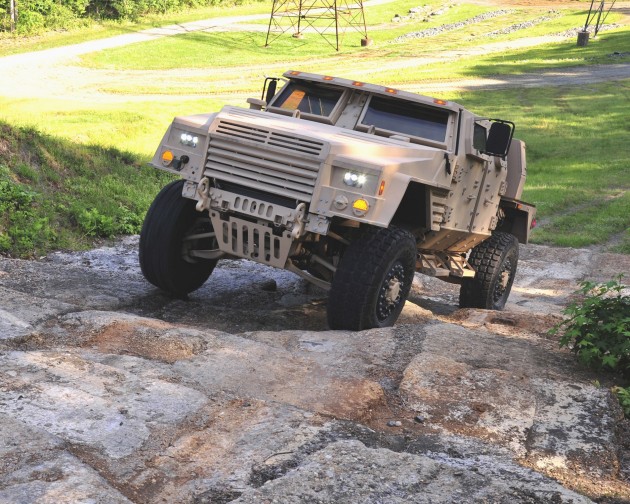Lockheed Protests JLTV Award To Oshkosh; AM General Doesn’t
Posted on

Lockheed Martin’s prototype JLTV
Aerospace giant Lockheed Martin is protesting the Army’s award of the 55,000-truck Joint Light Tactical Vehicle program to rival Oshkosh. The other losing bidder, Humvee-maker AM General, announced today that it will not protest.
Lockheed provided me the following statement after I asked them about the AM General announcement:
“After evaluating the data provided at our debrief, Lockheed Martin has filed a protest of the award decision on the JLTV program. We firmly believe we offered the most capable and affordable solution for the program. Lockheed Martin does not take protests lightly, but we are protesting to address our concerns regarding the evaluation of Lockheed Martin’s offer.”
Protests of large contract awards to the Government Accountability Office (GAO) have become painfully common, with defense firms fighting ever more desperately over fewer and smaller programs. But Lockheed Martin is hardly starving. With over $45 billion in annual sales (as of 2014), it’s the largest defense contractor on the planet, building everything from trucks like JLTV to the stealthy F-35 Joint Strike Fighter. So why is Lockheed protesting?
For that matter, why is AM General not protesting? Compared to Lockheed, AM General is a much smaller firm with much more at stake in this one contract: Military trucks are its core business and the iconic Humvee is its primary product. AM General was arguably the competitor with the most at stake on JLTV, which will replace many (though not all) Humvees. If just one company felt desperate enough to protest, I’d have expected it to be them, not Lockheed.
For Lockheed to protest and AM General not to, agreed one Hill staffer, is “completely opposite from what I expected.”
 AM General: The Better Part of Valor
AM General: The Better Part of Valor
“We believe a protest would ultimately result in a distraction from our current growth business areas,” AM General said in a statement this afternoon. “Specifically, with approximately 230,000 HMMWVs currently serving [nations] around the world, AM General has a critical role in ensuring these vehicles remain mission ready and as capable as possible.” In fact, AM General keeps building new Humvees — more on that in a moment.
“The JLTV does not and will not replace the HMMWV,” the AM General statement continues. “The Army and Marine Corps have repeatedly emphasized the need to modernize and maintain the more than 160,000 HMMWVs in their service.” (Compare that to the planned production run of just 55,000 JLTVs and you get 105,000 Humvees that won’t be replaced). “AM General intends to aggressively develop and execute, in partnership with the Army and Marine Corps, a comprehensive HMMWV modernization and maintenance program.”
As if to prove the point, less than an hour later, AM General pushed out a second release, announcing a $428 million award to build Humvee ambulance variants for the Army, Reserve, and National Guard to use in domestic disaster response. The first $89.5 million increment alone funds 654 new vehicles.
So AM General has decided to stake its future on sustaining and upgrading the trucks it has already built, those quarter-million Humvees worldwide. Fighting its primary customer, the Army, over JLTV would apparently put that business at too much risk.

Part of Lockheed’s massive Camden, Ark. campus.
Lockheed: The Latest Gamble
By contrast, Lockheed wants to roll the dice. The aerospace giant already took a significant risk on JLTV, most notably by buying BAE’s entire vehicle production line and physically relocating it from Sealy, Texas to Lockheed’s missile factory in Camden, Arkansas. Without JLTVs to build, it’s not clear what that production line is going to do.
Even Lockheed’s JLTV design was higher-risk than its competitors. The proposal benefited from the aerospace titan’s advanced manufacturing and computer modeling expertise, with 1,500 years of simulated production, but it lacked the track record of actually building trucks that Oshkosh and AM General could boast.
As of August 25th, when the Army announced its choice of Oshkosh, it looked like Lockheed’s gambles hadn’t paid off. Now the company’s doubling down and taking one last risk it hopes will redeem the rest.
Subscribe to our newsletter
Promotions, new products and sales. Directly to your inbox.
